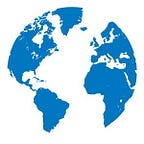“I’m not scared anymore.” Joan’s Story
I am Joan. I’m 25 years old. My story started in 2016 when I left my village in central Uganda for school. My uncle came with me from the village and I started staying with him. But after some time, he started using me. He used me four times, and it was actually that fourth time I missed my period. I went to a small clinic to check myself — they told me, “You are pregnant.”
Fingers wrapped around a plastic ballpoint pen, Joan’s hands rest on her lap. She wears unassuming grays — a gray hoodie, a gray dress — with a surprising splash of red from the thin band of her watch and the occasional glimmer from her sparkling earrings. Sitting under the shade of a tree, Joan is sharing her story with a small group of people.
I was scared and I didn’t know what to do. The nurse from that clinic told me, “I can do this for you.” So he gave me something…the blood started flowing.
After a week, the blood was still flowing and I was still in pain. A colleague of mine told me, “I’m going to take you somewhere.” She brought me to a different clinic run by Kyetume. I talked to the nurse there, Margret, and she comforted me. She treated me, and after a while I was fine.
Margret, the nurse who treated Joan that fateful day nearly two years ago, sits beside her. Margret is wearing clean white scrubs and a green apron. Her face is solemn as she listens to Joan’s story and nods along familiarly. They’re sitting in plastic chairs in a grassy area away from the other patients at a health clinic run by Kyetume Community Based Health Care in central Uganda.
According to research released last year by Guttmacher, the Center for Health, Human Rights and Development, and Makerere University, a majority of pregnancies in Uganda are unintended, and around 25 percent of those pregnancies ended through abortion. While the penal code criminalizes abortion, there are exemptions in cases where the woman’s life is in danger. Further guidelines permit abortion in cases of fetal anomaly, rape and incest, or if the woman is HIV positive. But access to safe and legal abortion remains limited and policies like the global gag rule further restrict it, and stigma makes it difficult to ask for help or to even simply talk about abortion.
For Joan and other survivors of rape and incest, coming forward and seeking help can be difficult and sometimes even dangerous. For better or worse, pregnancy brings it all to a head. Survivors who wish to end their pregnancy are forced to seek help, risking stigmatization by the community (for the incest and the abortion), imprisonment due to abortion laws that are often inconsistently interpreted, and even their very lives when the abortion services they seek are unsafe.
I wasn’t willing to keep the pregnancy because I was still studying. And I couldn’t tell my mom or my dad that my uncle did this, because he promised to do something bad to me. I was so scared.
The nurse talked to me about family planning and I was actually given an IUD (intrauterine device). I didn’t get any problems with it; I didn’t get any pain. Now, I don’t get scared that I’m going to get pregnant.
Joan is graduating from her studies this year and wants to be financially stable and get a job, “something dealing with figures, because I studied statistics” she says. She sees marriage and a family in her future, and she now has a boyfriend. She has told him about what her uncle did to her and the pregnancy.
He wasn’t happy with it. After some time though, he realized this happened but that it’s not going to happen again. I told him everything. I want to start a family with him… until the time I’m ready with my man is when I’ll get pregnant.
Joan hopes her story can help other women in a similar situation.
I’m sharing this because there are many other people, like students at school, who are being used by relatives, or work mates… I’m a leader so I do talk to them….when I talk to them they get encouraged by it to get help if they are in that situation… I’m not scared anymore.
Written and photographed by Stuart J. Sia, who leads communications for Planned Parenthood Global. Stuart holds an M.S. in Journalism from Columbia Journalism School and an M.P.H. in Population & Family Health from Columbia University Mailman School of Public Health. He is also a two-time, Emmy-award-winning producer based in New York City.
